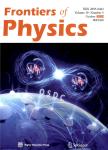The reservoir learning power across quantum many-body localization transition
作者机构:State Key Laboratory of Surface PhysicsInstitute of Nanoelectronics and Quantum Computingand Department of PhysicsFudan UniversityShanghai 200433China Shenzhen Institute for Quantum Science and EngineeringSouthern University of Science and TechnologyShenzhen 518055China Shanghai Qi Zhi InstituteAI TowerXuhui DistrictShanghai 200232China
出 版 物:《Frontiers of physics》 (物理学前沿(英文版))
年 卷 期:2022年第17卷第3期
页 面:91-99页
核心收录:
学科分类:07[理学] 070201[理学-理论物理] 0702[理学-物理学]
基 金:This work was supported by the National Program on Key Basic Research Project of China(Grant Nos.2021YFA1400900 and 2017YFA0304204) the National Natural Science Foundation of China(Grant Nos.11774067 and 11934002) Shanghai Municipal Science and Technology Major Project(Grant No.2019SHZDZX01) Shanghai Science Foundation(Grant No.19ZR1471500) the Open Project of Shenzhen Institute of Quantum Science and Engineering(Grant No.SIQSE202002) X.Q.acknowledges support from the National Postdoctoral Program for Innovative Talents of China under Grant No.BX20190083
主 题:quantum reservoir computing many-body localization quantum ergodic edge of quantum ergodicity optimal learning power
摘 要:Harnessing the quantum computation power of the present noisy-intermediate-size-quantum devices has received tremendous interest in the last few years. Here we study the learning power of a one-dimensional long-range randomly-coupled quantum spin chain, within the framework of reservoir computing. In time sequence learning tasks, we find the system in the quantum many-body localized (MBL) phase holds long-term memory, which can be attributed to the emergent local integrals of motion. On the other hand, MBL phase does not provide sufficient nonlinearity in learning highly-nonlinear time sequences, which we show in a parity check task. This is reversed in the quantum ergodic phase, which provides sufficient nonlinearity but compromises memory capacity. In a complex learning task of Mackey–Glass prediction that requires both sufficient memory capacity and nonlinearity, we find optimal learning performance near the MBL-to-ergodic transition. This leads to a guiding principle of quantum reservoir engineering at the edge of quantum ergodicity reaching optimal learning power for generic complex reservoir learning tasks. Our theoretical finding can be tested with near-term NISQ quantum devices.



